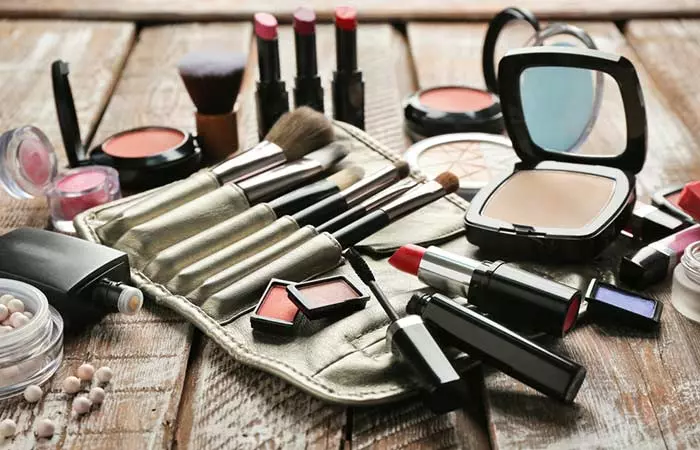There are several reasons this ingredient is finding a place in almost all skin care and cosmetic products.
Why Is It Used In Skin Care And Cosmetic Products?
When you apply dimethicone to your skin, it leaves a very subtle gloss-like but mattified finish on your skin. Dimethicone has fluid properties, and that’s why it spreads easily on your skin. It serves specific purposes in cosmetic and skin care products:
1. It Fills Your Skin Pores
Dimethicone is a common ingredient in primers. You need a smoother base for your makeup to sit properly on your skin. And for that, you need a smooth skin texture – this is where dimethicone can help you.
2. It Moisturizes Your Skin
It does this without weighing your skin down. It does not feel sticky and greasy yet keeps your skin hydrated. That’s why you will see this ingredient replacing petroleum-based ingredients in skin care products.
3. It Doesn’t Clog Your Pores
The best part about dimethicone is that it is non-comedogenic. It doesn’t clog your skin pores and is hypoallergenic. Hence, it is best suited for acne-prone and sensitive skin (1). Since it doesn’t make your skin feel greasy, even people with oily skin may find it suitable for their skin.
4. It Protects Your Skin
Harsh weather conditions, pollution, and other factors might make your skin dry and affect its natural barrier. Dimethicone protects your skin from all of these factors. The U.S. Food and Drug Administration also approves this ingredient as a “skin protectant” drug (2). Dimethicone also prevents scarring, soothes your skin especially if you have psoriasis or eczema, and prevents dryness caused by certain acne medications. That’s an impressive list of benefits. So, is dimethicone safe to use or are there any considerations? Scroll down to find out.
Dimethicone: Is It Safe To Use?
The FDA considers dimethicone safe for use. The Cosmetic Ingredient Review (CIR) expert panel also concluded that dimethicone is a safe ingredient (3). In most cases, dimethicone is a safe ingredient. However, some skin types may experience irritation. Here are a few areas of concern that you should keep in mind before using any product with dimethicone.
1. It Might Dry Out Your Skin
Just like petroleum jelly, dimethicone can cause dryness. The more you use it, the more it interferes with the natural hydrating process of your skin. Such prolonged exposure often creates product dependency. This means, once you stop using it, the fine lines and wrinkles become noticeable as your skin gets dehydrated.
2. It Might Aggravate Acne
Although it is non-comedogenic, some people might experience breakouts on using dimethicone products. Dimethicone covers your skin and traps moisture. But, along with moisture, it may also trap bacteria, sebum, and other impurities. This might cause blackheads and breakouts. Hence, you should clean your face thoroughly before applying the product. Dani, the skin care blogger, shares her experience with waking up to persistent oil glands around her eyes. After doing some research, she says, “I discovered that both the primer I used and the eye cream consisted of an ingredient called Dimethicone. Dimethicone is another word for Silicone, which I realized I was obviously allergic too. I was nervous to try out other eye creams and primers, but when I did, I made sure none of the ingredients consisted of Dimethicone, Silicone, or any other fancy name for it. Turns out, I didn’t get an allergic reaction from these new products (i).” There has been a lot of debate on whether silicone and similar products are good for the skin or not. While research claims them to be safe, we cannot completely ignore anecdotal evidence that states otherwise. Moreover, many people do not like the texture of dimethicone and silicone-based products and the way they feel on the skin. If you still want to try a few products, here’s a list. Is dimethicone a carcinogen? Dimethicone is not a carcinogen. It is considered a safe ingredient in cosmetics. In addition, there are no recorded studies regarding its adverse effects. Is dimethicone a hormone disruptor? Dimethicone is not a hormone disruptor. No studies report a link between dimethicone and hormone disruption. Is dimethicone natural? No. Dimethicone is a synthetic product. Does dimethicone cause itching? Yes. Prolonged exposure to dimethicone can cause itching. It may also cause allergic reactions, rash, and skin and eye irritation. Discover the benefits of dimethicone in skin care, a compound that forms a protective barrier, keeping in the moisture in dry or mature skin. Learn more by hitting the play button on the video below.
References

![]()





